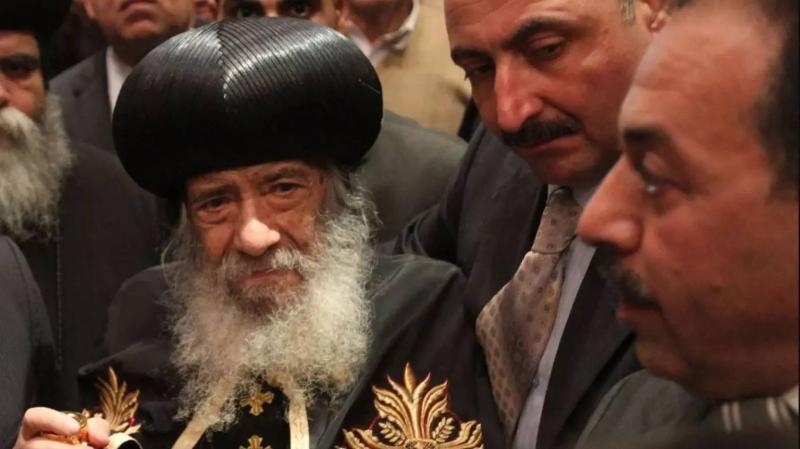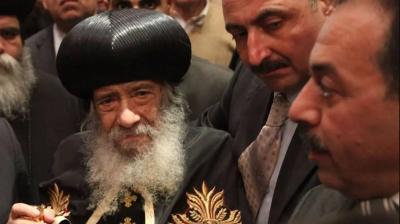I will never forget that day when His Holiness Pope Shenouda III summoned a large gathering of distinguished Egyptian and Arab intellectuals, politicians, and media figures in the grand hall of the Cathedral of St. Mark. This took place at the beginning of this century when the Palestinian issue was going through one of its most difficult turns, with the great Palestinian leader Yasser Arafat confined to his headquarters in Ramallah. The regional atmosphere was generally tense due to Israel's well-known policies and aggressive actions. Among the invitees were two officials from the presidential institution: the late Ambassador Osama Al-Baz, advisor to the President for political affairs, and the author of these lines, who was then the head of the Foreign Relations Committee in the Egyptian parliament. Everyone gathered to hear a national speech brimming with knowledge, politics, and spirituality from His Holiness, who was referred to by all as "the Pope of the Arabs" due to his clear national positions and steadfast principles, both Arab and Egyptian.
That day, the Pope made a public phone call to President Abu Ammar in front of thousands of attendees, which had a positive impact on the president, who along with his political fellow fighters was suffering from political isolation and, if I may say, forced exile at that time. Pope Shenouda always emphasized the Arab identity of Egypt's Copts and their strong support for the legitimate Palestinian rights, showing clear sympathy for the difficult conditions faced by the Palestinian people over the span of three-quarters of a century. He was the Pope who delivered a famous lecture on the relationship of the Jews with Jesus Christ and their sins against him, and he reiterated that the Jews are not the chosen people of God, just as Palestine is not the Promised Land. The late Pope supported this with evidence and proofs; it is clear to us that Pope Shenouda was a master of history, a scholar in theology, and knowledgeable in many issues related to Arab Islamic civilization and regional affairs throughout the centuries.
I remember my meeting with him, where I was impressed by his vast knowledge and comprehensive view of the religions of the People of the Book. I also recall his firm stance against allowing Copts to visit Jerusalem and venerate the Church of the Nativity, insisting that Muslims and Christians should enter Jerusalem and its Al-Aqsa Mosque and the Church of the Resurrection as united groups without discrimination, so that all could enter the holy city. Because Jerusalem is a city for the followers of the heavenly religions without distinction or discrimination, but the Zionist movement changed the clear historical landmarks and tried to erase the identity of that sacred Arab city. However, there were aware and knowledgeable individuals around the world on guard, as distorting history does not extend to messing with religions as well.
The Coptic Church has always held onto its principles, maintaining steadfastness regarding the Palestinian cause, considering that the Copts of Egypt are an integral part of the rich Egyptian tapestry that respects facts, believes in principles, and clings to constants. The Coptic Church has enjoyed a great deal of national respect and a sense of patriotism, believing in the shared destiny of all citizens of the same homeland. I was on a parliamentary visit in Bahrain on the day His Holiness Pope Shenouda III passed away, and that day I realized that the good memories remain and the good reputation endures. Sadness was evident among everyone over the departure of that esteemed leader who gave the Coptic Church a clear glow.
His enlightened successor, Pope Tawadros II, has continued his journey, known for his wisdom, calmness, ability to face difficulties, and solving problems using the shortest methods and least losses. The Coptic Church has always cooperated with Al-Azhar Al-Sharif in a long historical embrace under the banners of Arab nationalism and Egyptian patriotism, with the blood of all mixing in the wars fought by the region to preserve its dignity. The Coptic Church, which includes the largest number of Christians in the Middle East, has always maintained its principles, keen on its rituals, and steadfast in its constants, especially since the Palestinian people's cause has currently become, indeed, a cause of missed opportunities. Furthermore, after the recent war on Gaza, it has penetrated the conscience of humanity across all corners of the earth, becoming a topic of astonishment regarding Israel's arrogance and its methods, which have always been characterized by denial of facts, manipulation of sacred places, and distortion of history.




